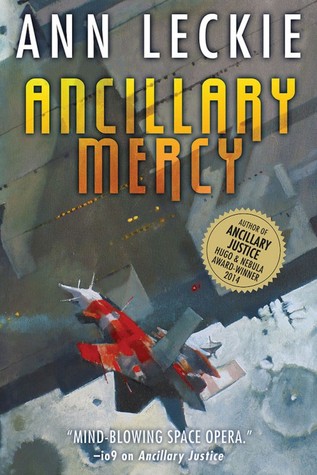 Ancillary Mercy by Ann Leckie
Ancillary Mercy by Ann Leckie Series: Imperial Radch #3
Published by Orbit on October 6, 2015
Genres: Science Fiction
Pages: 336
Format: eARC
Source: Publisher





Amazing, if you think about it, how quickly the new and strange can be adjusted to. Ancillary Justice came out and took the genre by storm; I personally called it a glorious mindfuck for the way it played around with language and perception. This was a book that was lauded for many things: a great story, a unique take on immortality, and the ancillaries of a single mind in constant communication. Yet the conversation quickly narrowed in on one aspect of Leckie’s writing; the universal use of feminine pronouns.
It was something of a shame too. Because while the game of trying to guess which characters were male and which were female before realizing how little it actually matters was a great experience it wasn’t the entirety of the book. But detractors quickly classified the book as a gimmick, fans often found themselves on their heels defending this specific aspect of the book, and amusingly certain groups with political agendas decided the book was everything wrong with speculative fiction when they fixated on ‘the gender thing.’ Ultimately the series got what it deserved; winning awards all over the place. And now here we sit with the trilogies conclusion.
All of this is a long winded intro so I can make a simple point before moving on with the rest of the review. The first book certainly made an impression by being different, by forcing the reader to think about things in an unfamiliar way, and by having a general WTF feel to it. It certainly could have fooled many intelligent people into thinking it was ‘good’ when in reality it was just unique. I can think of several books that almost fooled me in this fashion. So finishing up this series I want to assure everyone of something.
Once you get past the different, past the unique, and past the WTF this series is still the most rewarding experience I have had in three years of reviewing books critically. Ancillary Mercy, using the same language that caught everyone’s eye when Justice first came out, is now as easy to read as the morning paper and yet as engaging as anything in the genre.
How does a series with galaxy spanning implications draw to a close without leaving a small, singular section of space? More importantly how does it do so in a satisfying manner when dealing with an opponent that has unlimited bodies spread all over space? Pay attention friends, this is how a series is done right. Breq, formerly a starship and now leader of a one system revolution against one single aspect of a tyrant, is allowed a finish. Not every loose end is taken care of, to be honest any more would have probably killed the wonder, and so a satisfying conclusion to this tale has been given.
Along the way we get a few surprises. Most noticeable for me is the humor that is present more than at any other point of the series. Breq herself gives us some lighter moments; including padding a report with results of radish growing competitions. But most of the humor comes from the translator to the mysterious Presger (an alien group that once treated humans as their own ant farm but is now confined by a treaty). Zeiat, while acting as a translator between two races provides the humor by some humorous cultural misunderstandings. In lesser hands Zeiat could have been nothing more than a cheap form of comic relief but here she serves a very real purpose within the story. Beneath the humor of the misunderstandings is the constant reminder that even a culture as expansive as the Radch are at risk. The Presger are held in check only by a treaty they signed; a treaty the Radch still doesn’t completely understand the implications of.
While this series has been the story of Breq throughout she is not the only character worthy of following. Seivarden has been around from the start of this trip and deserves her own ending. Hers is perhaps the most emotional storyline; struggles with relationships, narcotic addiction, and her own personality are all addressed and add a very human touch to a lofty science fiction story. To paraphrase a twitter friend of mine there is actual cuddling in this book…and it is a perfect fit for the scene.
Bring it full circle. I loved everything about the series. The WTF nature of the first book, the quasi-Culture feel of book two, and a conclusion that is impossible to fault. Three books in I still found myself searching for occasional gender clues and realizing that they would only work if I also was working with very specific cultural assumptions that I shouldn’t be assuming; all by design. A small part of me hoped the series would become the next Culture; living forever and poking holes in cultural assumptions and attitudes. But getting a near perfect conclusion will be perfectly acceptable.
- Review: The Last Days of New Paris by China Miéville - December 5, 2016
- Review: The Labyrinth of Flame by Courtney Schafer - December 9, 2015
- Giveaway: Updraft by Fran Wilde - November 6, 2015


No Comments
Comments are closed.